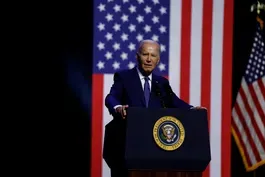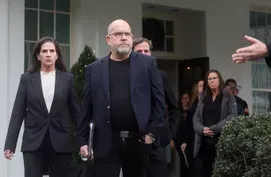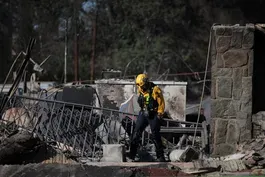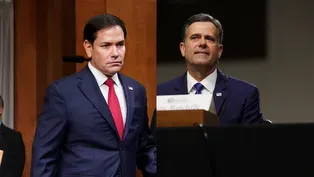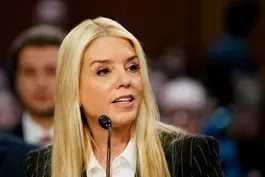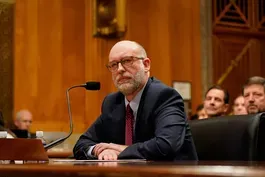
Mideast experts analyze the Israel-Hamas ceasefire deal
Clip: 1/15/2025 | 7m 32sVideo has Closed Captions
Mideast experts analyze the Israel-Hamas ceasefire deal and its chances of holding
To discuss the Israel and Hamas hostage and ceasefire deal that could end the 15-month war in Gaza, Geoff Bennett spoke with David Makovsky of The Washington Institute for Near East Policy and Hussein Ibish of the Arab Gulf States Institute in Washington.
Major corporate funding for the PBS News Hour is provided by BDO, BNSF, Consumer Cellular, American Cruise Lines, and Raymond James. Funding for the PBS NewsHour Weekend is provided by...

Mideast experts analyze the Israel-Hamas ceasefire deal
Clip: 1/15/2025 | 7m 32sVideo has Closed Captions
To discuss the Israel and Hamas hostage and ceasefire deal that could end the 15-month war in Gaza, Geoff Bennett spoke with David Makovsky of The Washington Institute for Near East Policy and Hussein Ibish of the Arab Gulf States Institute in Washington.
How to Watch PBS News Hour
PBS News Hour is available to stream on pbs.org and the free PBS App, available on iPhone, Apple TV, Android TV, Android smartphones, Amazon Fire TV, Amazon Fire Tablet, Roku, Samsung Smart TV, and Vizio.
Providing Support for PBS.org
Learn Moreabout PBS online sponsorshipGEOFF BENNETT: For more on all of this, we turn now to two "News Hour" regulars, David Makovsky of the Washington Institute for Near East Policy and Hussein Ibish of the Arab Gulf States Institute in Washington.
Thank you both for being here.
Hussein, we will start with you.
President Biden today made clear that he laid out the precise contours of this agreement back in May.
HUSSEIN IBISH, Senior Resident Scholar, Arab Gulf States Institute: Right.
GEOFF BENNETT: It was, of course, almost agreed to in July.
Why now?
HUSSEIN IBISH: Well, and even it had antecedents going back to January and even November of 2023.
So these ideas have been around for a long time.
But I think the two inflection points are the election of Donald Trump and the pressure he put on Prime Minister Netanyahu, which builds on pressure from the Israeli public and the Israeli military to make such a deal.
I think Netanyahu -- Trump was very clear that he did not want this war to go on during his inauguration.
And on the other hand, a major change of power within Hamas, inflected mainly by the fall of the Assad regime, which signals the rise of Turkey and Qatar in the region, at the expense of Iran and Hezbollah, and shifts power within Hamas away from the gunmen on the ground in Gaza who did the October 7 attack back to the politicians, the politburo, that have left Qatar, but are now gathered in Turkey.
And the main regional card that Hamas can play now is not the military links they have with Iran, but the political and diplomatic links they have with Turkey and Qatar.
And Turkey and Qatar don't want this war to go on.
So between pressure on those two sides, you got a deal.
GEOFF BENNETT: David Makovsky, there was a temporary cease-fire that was in place in November of 2023 that fell apart after a week.
It fell apart on the eighth day.
What's different about this agreement or what's different about the climate that might suggest the cease-fire deal might be more enduring?
DAVID MAKOVSKY, Senior Fellow, Washington Institute for Near East Policy: Like you said, that was the last big point was November, when 105 hostages were released for a few days of cease-fire.
This is a much more ambitious effort in terms of not just a few days, but at least 42.
And we hope it's extended.
Your heart goes out to the families of these hostages who are being reunited and also to the people of Gaza who are going to get relief.
I agree with Hussein Ibish that there's been a convergence of factors here.
I mean, I agree with President Biden when he said it happened because of the extreme pressure on Hamas that it's been under, and Nick Schifrin and his setup piece about that, losing Hezbollah -- they were fighting in stereo.
And now they're -- Hezbollah is out of the war after the death of Sinwar, the death of Nasrallah and the decapitation and the weakening of Iran, Biden said the weak -- the worst than in decades -- its weakest in decades, and the transition between governments, clearly, the fact that I think there's unprecedented in American history that an in going and outgoing administration were sitting at the same table to get this done.
They can't agree between Biden and Trump if it's light or dark outside, but they could agree on this.
And -- but all these people want to be in the good graces of the United States, of a new administration.
And I think that was also part of it as well.
But I guess I disagree a little bit with Hussein in that I don't think it's just the external elements of Hamas.
The people that hold the keys to the hostages are in Gaza.
And those are the people who are doing the killing.
And so I think, without weakening them, you would not have had a deal.
HUSSEIN IBISH: No, I agree with that.
GEOFF BENNETT: And there's such fragility around the cease-fire deal.
And the road ahead, of course, will be critical.
But who are the guarantors?
Who are the people on the ground who can ensure that both sides abide by the terms of this agreement?
Because there's no international -- there's no international observers.
There's no government structure that can make sure of that.
HUSSEIN IBISH: No.
Really, the parties are on their own, I think.
It's up to -- after the 42 days, which they will both probably live up to, both sides are going to have to decide if they want the agreement to survive the 42 days and then to go into a second phase.
And they're both going to have to agree.
Either side could decide to scuttle things at any moment.
And, certainly, especially within Gaza, a small group of people with guns could do something violent and give Israel the -- either the reason or the or the excuse to say, no, the war is back on.
So it's going to be very delicate.
I think, if the leaders are committed to following through into a second phase, they're going to have to be willing to put up with some provocations that maybe simply have to be baked into the process.
Otherwise, there are no external guarantors.
There is no one overseeing this.
GEOFF BENNETT: And, moving forward, the incoming Trump administration, David, believes it has the upper hand.
Of course, for a new presidential administration, leverage can be a wasting asset.
How do you assess the Trump team's chances of helping both sides navigate their way toward a lasting peace?
DAVID MAKOVSKY: Look, this is going to be hard.
I think what the Trump administration is counting on is that Netanyahu in a certain way wants to turn the page and have a much broader conversation with the incoming administration about regional opportunities and regional challenges.
The opportunity is, is a normalization deal with the Saudis, which you have to credit the Biden people.
They are the ones who did a lot of the work on this, but Trump might get the benefit of it.
And that is something the Israelis want very much as part of a wider mega-deal with Saudi Arabia and the United States.
That is the opportunity.
And the challenge is, what do you deal with Iran now that it has been weakened?
Some of you know I like sports metaphors.
And this is like -- Iran is like a soccer team without a goalie.
They have no air defenses right now.
So, is this a way to leverage getting Iran to the table on nuclear terms that they wouldn't agreed to before?
But this is a broader conversation.
It goes way beyond Gaza.
There is an opportunity here for Netanyahu to engage the administration.
If everything is just Gaza, Gaza, Gaza, it is going to be much harder to have that conversation that I think both the U.S. and Israel want to have.
So I do think there is an incentive there that should not be overlooked.
GEOFF BENNETT: In the minute we have left, do you agree?
And what does this mean for the governing authority, the governing structure in Gaza?
(CROSSTALK) HUSSEIN IBISH: That is exactly the problem.
There is the rub, because Israel has done nothing to prepare for this day and especially for phase two and phase three.
Netanyahu has refused to discuss a day-after scenario.
They have adamantly opposed any moves to create an alternative civil administration in Gaza.
So there is a straight-up, forward choice between Israeli military rule, the resumption of Hamas rule, which appears to be a strategic decision Israel has made in this agreement, for fear of strengthening the Palestinian Authority, which I believe they fear more than Hamas, because they think that the P.A.
might eventually be able to create a Palestinian state.
It's a continuation of the old policy of dividing the Palestinians.
And I think Israel is intending to leave Hamas in de facto control of Gaza, and there's no other way to interpret this agreement, frankly.
GEOFF BENNETT: Certainly more to come.
Hussein Ibish and David Makovsky, our thanks to you both.
HUSSEIN IBISH: Thank you.
DAVID MAKOVSKY: Thank you.
Biden's achievements will be realized, Jean-Pierre says
Video has Closed Captions
It will take a 'bit of time' for people to realize Biden's achievements, Jean-Pierre says (6m)
Father of Israeli-American hostage reacts to deal
Video has Closed Captions
Father of Israeli-American hostage reacts to deal, ‘the brink of ending this madness’ (5m 47s)
Israel, Hamas reach deal that could end 15 months of war
Video has Closed Captions
Israel, Hamas reach a hostage and ceasefire deal that could end 15 months of war in Gaza (5m 10s)
LA officials face firefighting strategy questions
Video has Closed Captions
Los Angeles officials face tough questions about preparedness and firefighting strategy (4m 5s)
News Wrap: FDA announces ban on Red No. 3 dye in food
Video has Closed Captions
News Wrap: FDA announces ban on Red No. 3 dye in food (6m 40s)
Rubio, Ratcliffe questioned on carrying out Trump's agenda
Video has Closed Captions
Rubio, Ratcliffe hearings give glimpse into how they would carry out Trump's agenda (5m 12s)
Trump's AG pick Bondi questioned about DOJ weaponization
Video has Closed Captions
Trump's AG pick Bondi questioned about potential weaponization of Justice Department (5m 22s)
Vought asked about replacing civil servants with appointees
Video has Closed Captions
Democrats ask OMB nominee Vought about goals of replacing civil servants with appointees (5m 52s)
Providing Support for PBS.org
Learn Moreabout PBS online sponsorshipMajor corporate funding for the PBS News Hour is provided by BDO, BNSF, Consumer Cellular, American Cruise Lines, and Raymond James. Funding for the PBS NewsHour Weekend is provided by...

